April 09, 2018
April 09
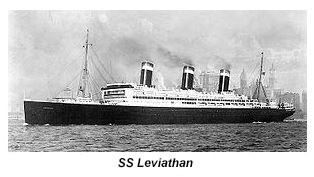 IWW organizes the 1,700-member crew of the Leviathan, then the world’s largest vessel – 1930
IWW organizes the 1,700-member crew of the Leviathan, then the world’s largest vessel – 1930
April 10
Birth date of Frances Perkins, named Secretary of Labor under President Franklin D. Roosevelt in 1933, becoming the first woman to hold a cabinet-level office – 1880
A total of 133 people, mostly women and girls, are killed when an explosion in the loading room tears apart the Eddystone Ammunition Works in Eddystone, Pa., near Chester. Of the dead, 55 were never identified – 1917
 Birth of Dolores Huerta, a co-founder, with Cesar Chavez, of the United Farm Workers – 1930
Birth of Dolores Huerta, a co-founder, with Cesar Chavez, of the United Farm Workers – 1930
Dancers from the Lusty Lady Club in San Francisco’s North Beach ratify their first-ever union contract by a vote of 57-15, having won representation by SEIU Local 790 the previous summer. The club, which later became a worker-owned cooperative, closed in 2013 – 1997
Tens of thousands of immigrants demonstrate in 100 U.S. cities in a national day of action billed as a campaign for immigrants’ dignity. Some 200,000 gathered in Washington, D.C. – 2006
April 11
Ford Motor Company signs first contract with United Auto Workers – 1941
 Jackie Robinson, first Black ballplayer hired by a major league team, plays his first game with the Brooklyn Dodgers at Ebbetts Field – 1947
Jackie Robinson, first Black ballplayer hired by a major league team, plays his first game with the Brooklyn Dodgers at Ebbetts Field – 1947
United Mine Workers President W. A. “Tony” Boyle is found guilty of first-degree murder, for ordering the 1969 assassination of union reformer Joseph A. “Jock” Yablonski. Yablonski, his wife and daughter were murdered on December 30, 1969. Boyle had defeated Yablonski in the UMW election earlier in the year—an election marred by intimidation and vote fraud. That election was set aside and a later vote was won by reformer Arnold Miller – 1974
Some 34,000 New York City Transit Authority workers, eleven days into a strike for higher wages, end their walkout with agreement on a 9-percent increase in the first year and 8 percent in the second, along with cost-of-living protections – 1980
 The Equal Employment Opportunity Commission issues regulations prohibiting sexual harassment of workers by supervisors in the workplace – 1980
The Equal Employment Opportunity Commission issues regulations prohibiting sexual harassment of workers by supervisors in the workplace – 1980
Police in Austin, Minn., tear-gas striking Hormel meatpacking workers. Seventeen strikers are arrested on felony riot charges – 1986
Some 25,000 marchers in Watsonville, Calif., show support for United Farm Workers organizing campaign among strawberry workers, others – 1997
April 12
A group of “puddlers”—craftsmen who manipulated pig iron to create steel—met in a Pittsburgh bar and formed The Iron City Forge of the Sons of Vulcan. It was the strongest union in the U.S. in the 1870s, later merging with two other unions to form what was to be the forerunner of the United Steel Workers – 1858
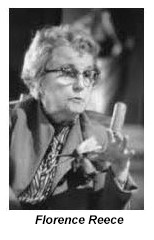 Birth of Florence Reece, active in Harlan County, Ky., coal strikes and author of famed labor song “Which Side Are You On?” – 1900
Birth of Florence Reece, active in Harlan County, Ky., coal strikes and author of famed labor song “Which Side Are You On?” – 1900
The Union Label and Service Trades Department is founded by the American Federation of Labor. Its mission: promote the products and services of union members – 1909
Twenty “girl millworkers,” attempting to relieve striking pickets at the Garfield, New Jersey, mill of Forstmann and Huffmann, were beaten “when they did not move fast enough to suit” 30 special deputies who ordered them off the site, according to a news report – 1912
Chris Turner is born in Floyd, Va. He went on to become a NASCAR driver and attempted, along with Fireball Roberts and Tim Flock, to organize the other drivers into a union in 1961 in the hope of better purses, a share in broadcasting rights and retirement benefits for the drivers. He was banned by NASCAR and was unsuccessful when he sued for reinstatement. The court said he was an individual contractor, not an employee of NASCAR or any track – 1924
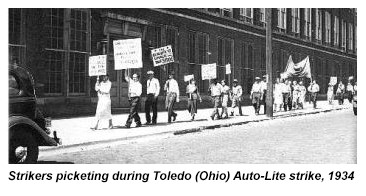 The Toledo (Ohio) Auto-Lite strike begins today with 6,000 workers demanding union recognition and higher pay. The strike is notable for a 5-day running battle in late May between the strikers and 1,300 members of the Ohio National Guard. Known as the “Battle of Toledo,” the clash left two strikers dead and more than 200 injured. The 2-month strike, a win for the workers’ union, is regarded by many labor historians as one of the nation’s three most important strikes – 1934
The Toledo (Ohio) Auto-Lite strike begins today with 6,000 workers demanding union recognition and higher pay. The strike is notable for a 5-day running battle in late May between the strikers and 1,300 members of the Ohio National Guard. Known as the “Battle of Toledo,” the clash left two strikers dead and more than 200 injured. The 2-month strike, a win for the workers’ union, is regarded by many labor historians as one of the nation’s three most important strikes – 1934
April 13
Int’l Hod Carriers & Building Laborers’ Union (today’s Laborers’ Int’l Union) is founded, as 25 delegates from 23 Local Unions in 17 cities—representing 8,186 Laborers—meet in Washington, D.C. – 1903
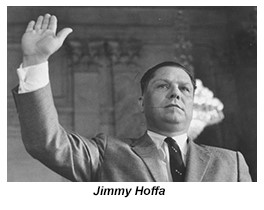 A 17-year-old Jimmy Hoffa leads his co-workers at a Kroger warehouse in Clinton, Indiana, in a successful job action: by refusing to unload a shipment of perishable strawberries, they forced the company to give in to their demands. Among other things: the “strawberry boys” had to report to work at 4:30 a.m., stay on the job for 12 hours, and were paid 32¢ an hour—only if growers arrived with berries to unload. Plus, they were required to spend three-fourths of any earnings buying goods from Kroger – 1930
A 17-year-old Jimmy Hoffa leads his co-workers at a Kroger warehouse in Clinton, Indiana, in a successful job action: by refusing to unload a shipment of perishable strawberries, they forced the company to give in to their demands. Among other things: the “strawberry boys” had to report to work at 4:30 a.m., stay on the job for 12 hours, and were paid 32¢ an hour—only if growers arrived with berries to unload. Plus, they were required to spend three-fourths of any earnings buying goods from Kroger – 1930
Labor leader and Socialist Party founder Eugene V. Debs is imprisoned for opposing American entry into World War I. While in jail he ran for president, received 1 million votes – 1919
April 14
More than 100 Mexican and Filipino farm workers are arrested for union activities, Imperial Valley, Calif. Eight were convicted of “criminal syndicalism” – 1930
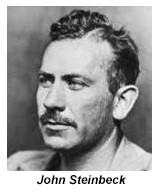 John Steinbeck’s The Grapes of Wrath published – 1939
John Steinbeck’s The Grapes of Wrath published – 1939
The United Steelworkers and the Paper, Allied-Industrial, Chemical and Energy Workers unions merge to form the largest industrial union in North America – 2005
April 15
A. Philip Randolph, civil rights leader and founder of the Brotherhood of Sleeping Car Porters, born in Crescent City, Fla. – 1889
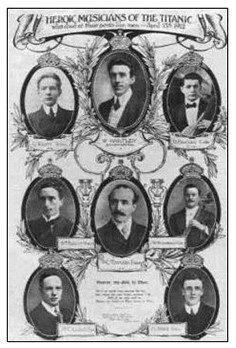 Eight members of the Musicians union die in the sinking of the Titanic. According to survivors, they played their instruments until nearly the end. Five weeks later a concert organized by the union to benefit the musicians’ families, held in a theater donated for the evening by impresario Flo Ziegfeld, featured the talents of 500 musicians. The evening ended with a rendering of “Nearer, My God, to Thee,” the hymn being played as the ship went down. The union at the time was called the Musical Mutual Protective Union Local 310, the New York affiliate of the American Federation of Musicians – 1912
Eight members of the Musicians union die in the sinking of the Titanic. According to survivors, they played their instruments until nearly the end. Five weeks later a concert organized by the union to benefit the musicians’ families, held in a theater donated for the evening by impresario Flo Ziegfeld, featured the talents of 500 musicians. The evening ended with a rendering of “Nearer, My God, to Thee,” the hymn being played as the ship went down. The union at the time was called the Musical Mutual Protective Union Local 310, the New York affiliate of the American Federation of Musicians – 1912
IWW union Agricultural Workers Organization formed in Kansas City, Mo. – 1915
Teacher unionists gather at the City Club on Plymouth Court in Chicago to form a new national union: the American Federation of Teachers – 1916
Start of ultimately successful six-day strike across New England by one of the earliest women-led American unions, the Telephone Operators Department of IBEW – 1919
Transport Workers Union founded – 1934
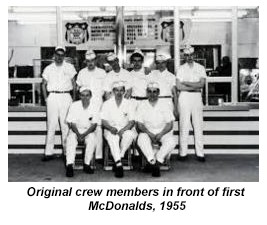 The first McDonald’s restaurant opens, in Des Plaines, Ill., setting the stage years later for sociologist Amitai Etzioni to coin the term “McJob.” As defined by the Oxford English Dictionary, a McJob is “an unstimulating, low-paid job with few prospects, especially one created by the expansion of the service sector” – 1955
The first McDonald’s restaurant opens, in Des Plaines, Ill., setting the stage years later for sociologist Amitai Etzioni to coin the term “McJob.” As defined by the Oxford English Dictionary, a McJob is “an unstimulating, low-paid job with few prospects, especially one created by the expansion of the service sector” – 1955
—Compiled and edited by David Prosten
